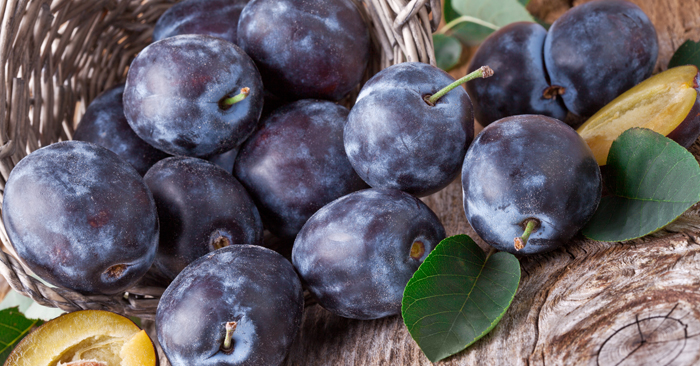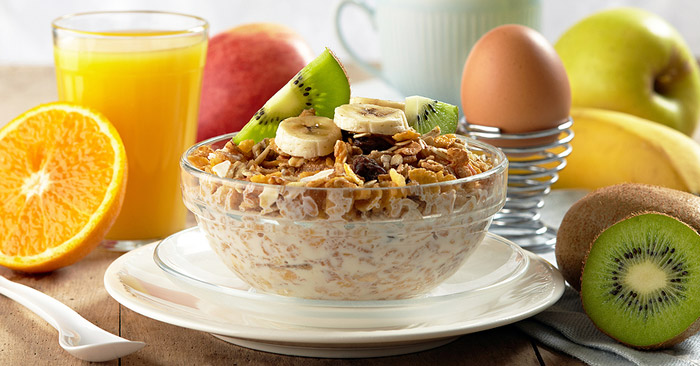We regularly publish some great healthy living tips, new recipes and other Prune tidbits on our blog
Digestive Health
A Focus on Digestion for World Digestive Health Day
Posted Fri, Jun 11, 21 by Sunsweet
The low down on digestion
Digestion is the body’s way of breaking down food. Although it’s a sensitive physical process, a healthy digestive system is something that many of us are lucky enough to be able to take for granted. If it gets out of synch, the entire body can feel its effects. Modern lifestyles with sedentary jobs, not enough exercise, the consumption of processed foods and stress can all take their toll on the gut. Over time, sluggish digestion can become a chronic problem. It can cause emotional issues, like anxiety, and physical issues, like bloating, reflux, constipation and diarrhoea.

Keeping tummy troubles at bay
When it comes to any health complaint, prevention is better than cure. And, fortunately, there are some simple and effective steps that can be taken to help to keep tummy troubles at bay. Having a good grasp of the digestive basics, choosing gut-friendly foods and adopting better eating habits can go a long way towards boosting digestive health.
Hints and tips
Read on for our Top 4 tips for maintaining a healthy digestive system.
- Eat more fibre rich foods
Prunes are a source of dietary fibre. According to the European Food Safety Authority, consuming around 100g of prunes – on a daily basis - helps to maintain normal bowel function. And the EU Commission has now authorised this health claim for use in the general population.
- Keep the water flowing
Dehydration can lead to headaches, lack of focus, fatigue, constipation and lacklustre skin so be sure your diet includes plenty of water and other fluids like prune juice.
- Keep moving
Regular physical activity not only revs up your metabolism, it also helps promote digestive health by keeping you “regular”.
- Take 5
Soothe away stress before it gets to you, by listening to calming music or simply phoning a friend to catch up.
And to find out even more? Download our expert guide on IBS.
The role prunes can play in maintaining good digestive health
There could be a number of reasons why your digestive system is working less than optimally. And, of course, there are a number of potential solutions to the problem. But the inclusion of Sunsweet prunes in your everyday diet can be a deliciously simple place to start. Our products are 100% natural and they can be enjoyed by the whole family including children, pregnant women and the elderly. And because we use only the best quality Californian prunes, the Sunsweet range really is the perfect complement to a healthy, balanced diet.
Please Note: Prunes are good for digestion and help keep you regular, when 100g are eaten as part of a varied and balanced diet and an active lifestyle. Always consult a GP if you have any health concerns.
A prune dressing adds a fruity twist to this delicious salad
Posted Fri, Jun 11, 21 by Sunsweet
It really is impossible to have too many salads up your summer recipe sleeve. Served on its own - with the addition of a handful of your favourite nuts - our Shaved Salad with Prune Dressing makes a wonderful light lunch. But it’s a super pretty and versatile side dish, too!

Ingredients
For the dressing:
- 2 tbsp extra virgin olive oil
- 2 tbsp SUNSWEET Prune juice
- 1 tbsp fresh lemon juice
- ½ tsp mustard (grain or smooth)
For the salad:
- 1 large carrot, peeled and trimmed
- 1 sharp apple (such as Cox), peeled and cored
- 2 golden or red beets, trimmed
- ½ bulb of fennel, trimmed
- 1 handful nuts, roughly chopped (I used hazelnuts, but almonds, cashews or walnuts are good too)
- 1 large handful of mixed rocket or lambs lettuce
- 1 tbsp fresh parsley, finely chopped
Instructions
- First make the dressing. Simply take all of the dressing ingredients, place in a jar, close and shake well. Set aside.
- Take the apple and all of the vegetables (apart from the rocket / lambs lettuce) and slice them as thinly as you can. You can use a mandolin, but a vegetable peeler works equally well.
- Place the green leaves in a wide, shallow serving bowl, and arrange the vegetable and apple slices on top.
- Sprinkle over the nuts (and cheese, if using), then top with the chopped parsley.
- Just before eating, drizzle with the dressing, toss gently, and serve immediately.
Other recipes you might be interested in...
Gluten Free Living
Posted Fri, Jun 11, 21 by Sunsweet
Following a gluten free diet has become much more popular and widespread, over recent years. A report by USA Today, for example, found that as many as one in four people were now attempting to live gluten free. In this feature, we will explore the differences between gluten sensitivity and coeliac disease and take a look at hints and tips for living gluten free, with the minimum of fuss.

What is Gluten?
But, first, what exactly is this gluten that we hear so much about? Gluten is the protein that is found in the grains – like wheat and barley and rye – that feature heavily in the everyday diets of so many of us. Think of all the bread and pasta and breakfast cereals that our families consume on a daily basis.
Many people report feeling bloated and sluggish after a particularly gluten rich meal, leading them to make a lifestyle choice of avoiding the protein wherever possible. Experts now believe that mild symptoms, like these, could be due to a sensitivity to gluten. The British Medical Journal does warn against self-diagnosis, though, because such symptoms could be down to something more serious, like coeliac disease.
Coeliac Disease
For people with coeliac disease - an autoimmune response to gluten – exclusion, for life, is the only treatment for the condition. It is estimated that around one percent of the population is affected by the condition. According to the NHS, “Reported cases of coeliac disease are two to three times higher in women than men and can develop at any age, although symptoms are most likely to develop during early childhood and in later adulthood.”
Coeliac disease – because it irritates and then subsequently damages the lining of the gut - causes painful diarrhoea that, in turn, can lead to weight loss, anaemia, extreme tiredness and even osteoporosis. (Why not take a look at our features on bone health, to find out more about this?). A gluten free diet allows the gut to heal and for the symptoms to improve.
Gluten Free Choices
The good news is that a gluten free diet doesn't have to be too restrictive. Many foods – like meat and fish, rice and potatoes, vegetables and fruit – can still be enjoyed as part of a healthy, balanced diet. Cafes and restaurants are now much more geared up towards offering a gluten free choice. And the even better news is that prunes are a naturally gluten free food – a serving of prunes or a glass of prune juice can be included in a gluten free diet. You can also add them to your favourite coeliac-friendly recipes for a sweet and fruity twist.
Need some inspiration?
Check out our recipe pages where we’ve recently added new gluten free recipes like Light Prune Focaccia, Dense Chocolate Cake, Homemade Lemon and Poppy Seed Cake … no need to compromise on taste.
We recommend you seek medical advice before making dietary changes.
Managing Irritable Bowel Syndrome with constipation
Posted Fri, Jun 11, 21 by Sunsweet
Irritable Bowel Syndrome with constipation is surprisingly common. And with a range of distressing – and potentially life-limiting – symptoms, it's something that you're going to want to nip in the bud. Fast. But don't worry. Help is out there. And there are a number of simple, self-care solutions that might just do the trick.

The Surprising Prevalence of IBS
If you are suffering from Irritable Bowel Syndrome (IBS) you are not alone. According to the IFFGD (*), 10-15% of the World's population suffer from this common complaint. Women, interestingly, are twice as likely to be affected by the syndrome as men. 40% of people have mild IBS, 35% of people have moderate IBS and 25% of people have severe IBS. And yet many people don't recognise their symptoms
(*) International Foundation for Functional Gastrointestinal Disorder
What is IBS and what causes it?
IBS is a condition that relates to symptoms - otherwise unexplained – that affect the digestive system. Symptoms can vary dramatically in their severity and duration and they can also come and go. Although the specific causes of IBS are not clear, psychological factors like stress can be a trigger factor for bringing on symptoms. Diet, food and eating can also affect symptoms with many sufferers noticing that their symptoms appear worse after a meal leading them to speculate about potential food allergies or intolerances. IBS has been subcategorised based on the symptoms: IBS with diarrhoea; IBS with constipation: or mixed, which includes both diarrheal and constipation traits.
Sufferers from IBS with Constipation (IBS-C), suffer from constipation.
Prunes and Normal Bowel Function
Prunes are high in fibre and contribute to normal bowel function when 100g prunes are eaten daily and as part of a varied and balanced diet and active lifestyle. And unlike many juices, prune Juice is a source of fibre.
Managing the Symptoms of IBS-C
The symptoms of IBS-C can often be managed by making dietary and lifestyle changes. People with IBS-C can take steps to alleviate their symptoms by modifying the amount of fibre that they include in their diet. The two main types of fibre are soluble (that the body can digest) and insoluble (that the body can't). Soluble fibre foods include oats, fruit and vegetables. Insoluble fibre foods include wholegrain bread and cereals. If you suffer from IBS-C, it makes sense to try to boost the amount of fibre in your diet and also the amount of fluids that you take in. The IBS Network, in the UK. echo traditional dietary advice for treating constipation and advocate:
- Boosting the amount of fibre in the diet, adding linseed to cereals and so on.
- Eating oats with dried fruit – especially prunes and apricots – for breakfast each morning
- Upping your fruit and veg intake, prunes and beetroot are particularly helpful.
Is there support available for people suffering from IBS-C?
You'll be relieved to hear that there is some excellent support out there. In fact, we've collaborated with The IBS Network UK – the country's national charity for sufferers of the syndrome - to produce a comprehensive, fact-based document packed full of up-to-date info and useful advice about managing IBS-C. The Network aims to facilitate a programme of self-care for sufferers by providing them with good quality information and support.
Why not download the 'Diet for Irritable Bowel Syndrome (IBS) Constipation' booklet to find out about:
- Dietary hints and tips
- The importance of fibre in the management of IBS-C
- Foods to include
- Foods to avoid
- An example of a daily food plan
PS: Looking for more info on digestion-related topics? Check out our Digestion 101.
Please Note: Prunes are good for digestion and help keep you regular, when 100g are eaten as part of a varied and balanced diet and an active lifestyle. Always consult a GP if you have any health concerns.
On Darker Days, Shine a Light on Emotional Wellbeing
Posted Fri, Jun 11, 21 by Sunsweet
It’s always important to be mindful of your mental health but never more so than when the days get shorter and gloomier. During the winter months, it can be hard to overcome the temptation to grind to a halt, physically. And inactivity, for a prolonged period of time, can throw everything off kilter: from our mood, to the digestion of our food and everything in-between.

Seasonal affective disorder (SAD) – also known colloquially as the winter blues – is a recognised condition. A key symptom of SAD is a low mood that worsens as winter progresses but other symptoms include:
- Irritability
- Feelings of lethargy
- Craving stodgy food and thus gaining weight
It’s always worthwhile seeking medical advice if you feel like you’re struggling to cope with day-to-day activities. But lifestyle adjustments – although sometimes difficult to implement when your energy levels are low – can help with the management of symptoms, too. It’s important to get as much sunlight as possible, for example, and to take positive steps toward managing your stress levels.
The impact of stress on digestion
Stress can be as bad for your body as it is for your head and can exacerbate a range of symptoms including poor appetite and tummy troubles. Digestion is a super-sensitive process, all too easily compromised by the stresses and strains of contemporary living. It’s the body’s way of breaking down food, a normal bodily function about which most of us never give a moment’s thought. But when the digestive system gets out of step, the entire body can feel its unwelcome effects. It can cause emotional issues, like anxiety, and physical issues, like bloating, reflux, constipation and diarrhoea. In these super-busy times, stress can feel almost inevitable. It’s worthwhile having a few tried and trusted techniques to hand, for when the pressure starts to mount. Practice mindfulness, walk with a friend, enjoy a soak in the bath, cook a delicious and healthy meal for you and a loved one to enjoy – whatever helps you to relax!
Lifestyle tweaks
After a long day, it can be hard to find the energy to eat well. But grabbing something convenient that’s low in nutrition may leave you with even lower energy levels – a vicious circle. Why not see if, with a little advance-planning, you can break that cycle? Rustle up some soups and stews in batches so that you can simply warm them up. Compile a list of a few temptingly tasty one-pot recipes. That way, you can prep dinner, pop it in the oven and then wrap up warm and buzz out for a quick walk while it’s cooking. The combination of fresh air and the increased oxygen levels that follow exercise helps to release serotonin, the feel-good chemical. Now that’s what we call a win-win!
Please Note: Prunes are good for digestion and help keep you regular, when 100g are eaten as part of a varied and balanced diet and an active lifestyle. Always consult a GP if you have any health concerns.
Prunes are perfect for mums-to-be and for kids of all ages, too!
Posted Fri, Jun 11, 21 by Sunsweet
When you’re having a baby – especially if you are becoming a mum for the first time – it can be tricky enough to sift through the advice from well-meaning friends and family. And that’s without factoring in the advice received from near-strangers! We think that the most important thing to remember, though, is that a happy mummy means a happy baby. And something that all new mums have in common is wanting to do the very best for their baby.

It’s important to find a couple of reliable information sources that you can really trust – and to treat all the other bits and pieces of unsolicited advice that are bound to come your way with a pinch of salt. We’ve compiled lots of expert tips for mums-to-be and for new mums on our dedicated pregnancy website. Why not check it out?
Prunes during pregnancy
Constipation is a common complaint during pregnancy with at least half of all expectant mothers affected, at some point. Fortunately, there are some simple diet-based solutions that could help:
- Drink plenty of fluids. Water, milk, natural fruit juices and herbal teas are all excellent choices. Sunsweet prune juice is also a great choice with its naturally occurring sorbitol and source of fibre. Why not start with the recommended daily serving of 120ml and see how that works for you?
- Make a concerted effort to include plenty of fruit, vegetables and whole grains in your diet to ensure that you have sufficient fibre. Sunsweet prunes are a high source of fibre and make a tasty and nutritious addition to recipes – both sweet and savoury. They are also a super-convenient snack food.
Prunes for new mums
- When you have a new arrival in tow, a good night’s sleep can quickly start to feel like a distant memory. It’s not surprising then that energy levels for new mums can hit an all-time low. Enjoyed straight from the pack, prunes are the ultimate grab-and-go snack.
- Prunes have a low Glycaemic Index (GI) of 29, which means that sugar (energy) is released relatively slowly on digestion.
- Are a source of vitamin B6, which helps you feel less tired, supports the normal release of energy from foods, & helps make normal blood cells.
- Are a source of copper & manganese, which support the normal release of energy from foods.
Prunes for children large and small
- Prunes that have been stewed with other fruits before pureeing – apples can work really well – make a lovely first food for babies. Follow the advice from your healthcare professional, about when to start weaning, and enjoy exploring new tastes with your baby.
And for older children, prunes can be enjoyed straight from the pack, included in the family’s favourite bakes or whizzed into a smoothie. Let your budding chefs be inspired by our recipe pages to create their own smoothies with prunes, prune juice and a repertoire of other healthy yummies!
Enjoy!
PS: Did you know that World Breastfeeding Week starts on the 1st August? Check out the website for lots of hints and tips on feeding your baby. Breast is best, after all. But it’s important to remember that a happy mum means a happy baby!
Please Note: Prunes are good for digestion and help keep you regular, when 100g are eaten as part of a varied and balanced diet and an active lifestyle. Always consult a GP if you have any health concerns.
Summertime and the living is easy
Posted Fri, Jun 11, 21 by Sunsweet
Summer weekends are a brilliant opportunity for catching up and chilling out. There’s one very simple trick that you can have up your sleeve, to ensure that you have as much fun during your get-togethers as your guests: advance planning!

Keep your menu simple
A showstopper dish – like a marinated whole chicken or a side of salmon with a herby crust - can be put in the oven and left to its own devices. And then around an hour before your meat or fish is ready, pop some baby new potatoes into the oven, too. Keep the potatoes whole and unpeeled and toss them in oil, herbs - rosemary works well – and a little sea-salt. Simple and delicious.
Enlist help
Guests often ask if they can bring something to gatherings so don’t be too shy to answer, “yes, please!”. Give each guest a theme, for a salad, and leave them to it. A green salad, maybe, or something tomato-based or involving mixed beans. You could even ask them to bring a fruit salad, for pudding. And – if they’re stuck - you can always signpost them to our recipe pages, for inspiration!
Keep everyone moving
A great way to break the ice at summer events – especially when there are little people involved – is to ask each family to share their favourite outdoor game idea. Tag. Hide and Seek. Pretty much anything involving bubbles or balloons. The fun factor will be boosted instantly. You’ll all work up an appetite for that yummy, healthy meal. And the kids will have bonded well enough to continue the fun, after the food, while the adults enjoy a well-deserved rest.
When it comes to summer celebrations, prunes are something of an unsung hero. And yet they can add a fruity scrumptiousness to a range of dishes and drinks. For sweet and savoury nibbles, think prunes baked with chorizo or – even simpler – flavoured mixed nuts (most supermarkets stock an interesting selection) combined with chopped prunes. As part of a fruity marinade or BBQ sauce, prunes add a rich flavour that complements a range of meat and fish and livens up grilled veggie kebabs. Prunes make a zingy addition to salads – both savoury and sweet. The fruit is the perfect partner for choc-themed puds – prune brownies, anyone? And prune juice makes a fabulously flavourful base for a range of drinks from smoothies to mocktails, from fruity cocktails that are strictly for the grown-ups to refreshing frozen treats that the whole family will love.
Our recipe pages are full of ideas for you to follow or be inspired by. And our comprehensive guide to entertaining is packed full of tips to help your summer celebrations sparkle!
Please Note: Prunes are good for digestion and help keep you regular, when 100g are eaten as part of a varied and balanced diet and an active lifestyle. Always consult a GP if you have any health concerns.
Tackling Tummy Troubles while Travelling
Posted Wed, Jun 16, 21 by Sunsweet
Tummy troubles are no joke, especially when you’re travelling and especially when you have small kids in tow. But are digestive complaints - like constipation – just “one of those things” when the family is on the move or are there some simple steps that you can take to nip any potential problems in the bud?

For many of us, holidays can mean:
- Taking our eye off the healthy eating ball with far more treats in our diet than we’re used to (and with far less fibre).
- Getting dehydrated. As the sun comes up, temperatures rise making everyone a little hotter – and a little thirstier - than they’re used to. And as the sun goes down, exotic cocktails can be a temptation for the grown-ups in the group. It’s really important to keep fluid levels topped up but – sorry! – alcoholic drinks don’t count.
- Relaxing by the pool rather than swimming the length and breadth of it. All that sunshine can make physical exercise feel like way too much effort.
And that little trio can combine to upset the bodily functions that most of us are usually lucky enough to be able to take for granted, resulting in a sluggish digestion.
Digestion is a complex physical process and when the digestive system gets out of synch, the whole body can feel its effects. Digestive troubles are far from uncommon amongst holiday-makers. That’s according to a survey by CondéNet and the California Dried Plum Board. More than 75% experienced occasional digestive problems while traveling and 42% suffered from constipation.
A sluggish digestion can quickly start to cause physical discomfort and even anxiety. So what can be done? We’ve pulled together our top tips for keeping things moving while you’re on the move.
Choose Well
Make healthy food choices - wherever possible – and make sure you drink lots. Water and diluted fruit juices are both excellent choices as they can quench your thirst and contribute towards good nutrition.
Keep Moving
Make sure that you factor in some daily exercise when your routine changes. Even while you’re travelling, it’s usually possible to move around from time to time. And something as simple as a brief stroll or a quick stretch really can work wonders.
Plan Ahead
Stock up on a selection of healthy, on-the-go snacks to take with you. Prunes, for example, are proven to promote healthy digestion. You can take the fruit with you, wherever you go. And the best news? Prunes are absolutely delicious!
Chill Out
Although it's not usually stress itself that causes health problems – like digestive issues - but how you handle that stress, it’s still important to find ways to unwind that work for you. Don’t forget to enjoy the journey!
Good digestive health – it’s what we do!
At Sunsweet, we’re passionate about good digestive health. Why not check out our top four tips for good digestive health and Simple Health Tips for People on the Go.
And if you’re looking for more comprehensive info, you can download our Healthy Living Guide!
Bon Voyage!
Please Note: Prunes are good for digestion and help keep you regular, when 100g are eaten as part of a varied and balanced diet and an active lifestyle. Always consult a GP if you have any health concerns.
The Top 6 Questions We’re Asked About Prunes
Posted Thu, Feb 27, 20 by Sunsweet
Everything you ever wanted to know about prunes – and, quite possibly, a little bit more besides - all in one place! Check out our official, super-informative Q&A on all things Sunsweet prune-related. The Top 6 Questions We’re Asked About Prunes.

- Are prunes gluten-free?
- Are prunes suitable for people with diabetes?
- Do prunes contain sugar?
- What effect do prunes have on the digestive system?
- What is the connection between prunes and strong bones?
- And, our favourite, just how exactly does a plum become a prune?
Reports suggest that – for a whole host of reasons - as many as one in four of us are now attempting to live gluten free. Gluten is the protein that is found in grains like wheat. And with things like bread, pasta and cereal being such a staple of everyday meal planning, going gluten free isn’t easy. But the good news? All fruit is naturally gluten free and so a serving of prunes or a glass of prune juice can be enjoyed whenever you like. You can even add them to your favourite coeliac-friendly recipes to give them a sweet and fruity twist.
Experts recommend that to keep blood sugar levels steady, we aim for a diet with an overall GI of 50 or less. But, happily, that doesn’t mean that sweet and tasty snacks like Sunsweet prunes are a no-no. Harvard Medical School found that the GI of pitted prunes is around 29 making them a low-GI fruit that doesn't dramatically affect blood sugar and insulin levels.
Prunes contain no added sugar. They are simply dried plums: one plum becomes one prune, just with the water removed. During the plum-prune drying process, sucrose is hydrolysed to glucose and fructose so prunes contain minimal sucrose. And prunes are classed as whole fruit so they can contribute towards achieving your 5-a-day, as well as boosting your daily fibre intake.
For centuries, prunes – and prune juice - have been associated with good digestive health. But now there are scientific findings to support that association, too. Research has shown that - when 100g of prunes are eaten daily, as part of a varied and balanced diet and an active lifestyle – they can assist with normal bowel function just as much as fibre supplements. In fact, prunes should be considered as a first line therapy when it comes to maintaining a healthy bowel.
Research suggests that prunes, due to the nutrients they provide, could be beneficial for bone health. Prunes contain vitamin K and manganese that - among other functions - have direct benefits for bone health. Prunes are also a source of vitamin B6 which helps make healthy blood cells in our bone marrow and maintain normal hormone levels including those involved in bone health.
It’s simple, really. Sunsweet prunes are a special variety of sun-ripened plums that have been dried to remove some of the water. A variety with an exceptionally high sugar content, these "Improved French" variety of plums give Sunsweet prunes their distinctively delicious taste; rich and fruity with notes of creamy vanilla. The dried fruit contains similar levels of nutrients – such as fibre - to fresh plums, while offering the added benefit of year-round availability and a long shelf life.
Please Note: Prunes are good for digestion and help keep you regular, when 100g are eaten as part of a varied and balanced diet and an active lifestyle. Always consult a GP if you have any health concerns.
Tip-top digestion: it’s what everybody wants for Christmas!
Posted Tue, Dec 24, 19 by Sunsweet
Most of us don’t give a second thought to our digestive systems, until they start to get out of sync. And then it’s hard to think about anything else… Be kind to your tum, this Christmas. Tucking into Sunsweet prunes and prune juice is a simple way to start!

OK, we understand that digestion isn’t the most festive of topics. But it’s at this time of year, when the food that we eat gets richer and more plentiful and – apart from dashing frenetically from shop-to-shop - our lifestyles become more sedentary, that we really need to keep on top of things, digestion-wise. Digestion is a complex chemical and physical process and a healthy digestive system can play an important role in our overall sense of well-being. If our digestion gets out of synch, the entire body can feel its effects with symptoms like bloating, reflux, constipation and diarrhoea.
It’s hard not to overindulge at Christmas. Most of us are guilty of stocking up our homes with deliciously tempting – but not always healthy! – food and drink. Traditional yuletide treats are typically low in fibre and they can be richer and more protein-packed than we’re used to, too. This - in combination with a higher intake of alcohol, a lower rate of physical activity and sky-high stress levels - can place extra demands on the digestive system.
Top Tips for Improving digestion
There is good news, though! Read on for some quick tips on improving digestion:
- We know it’s hard but try to take some regular time out of the ‘busy-ness’ to simply relax. Walking with a friend, some gentle yoga stretches, listening to music, whatever helps you to unwind.
- Be mindful of what you’re eating, especially when you’re busy and distracted. Chew well and eat slowly so that you’re more likely to stop eating before you get too full.
- It makes sense to avoid ice-cold drinks while eating, because they can contribute to a sluggish digestion.
- And try eating prunes and drinking prune juice daily!
Why prunes?
For years, prunes and prune juice have been associated, anecdotally, with digestive health. But now there are scientific findings to extoll the benefits of prunes. Prunes help to promote normal bowel function just as well as fibre supplements and they should be considered as a first line therapy when it comes to maintaining a healthy bowel.
So, the inclusion of Sunsweet prunes and prune juice in your everyday diet certainly makes a lot of sense! 100% natural, our products can be enjoyed by the whole family including children, pregnant women and the elderly. Prunes are surprisingly versatile and can add a nutritious boost to family meals at any time of the year. Their flavour can add depth and richness to comfort foods, like tempting mousses and slow-cooked stews. They can even add a fresh and fruity note to salads and smoothies, too.
Please Note: Prunes are good for digestion and help keep you regular, when 100g are eaten as part of a varied and balanced diet and an active lifestyle. Always consult a GP if you have any health concerns.
We Are What (And How) We Eat
Posted Fri, Jun 11, 21 by Sunsweet

Most of us have heard the phrase “you are what you eat”. However Dr. Nick Read, gives us a fresh perspective on this old saying including - “you are how you eat”.
Professor Nick Read is a consultant gastroenterologist and analytical psychotherapist. He uses both of these disciplines in combination to investigate and treat patients with mind-body diseases, particularly those with functional gastrointestinal disorders.
Dr. Read is currently the Chair of the IBS Network in the UK, an independent charity dedicated to support, inform and advise people with Irritable Bowel Syndrome (IBS).
While encouraging us to make the 5-a-day an integral part of our daily nutrition plans, he also draws our attention to the environment and manner in which we consume food. Relaxation, company and liking what you eat, for instance, all contribute to digestive health and overall well-being.
Maintaining the right fibre intake can also help many of our digestion and bowel problems. Dr. Read recommends natural prune juice (like Sunsweet®) as a nutritious and stimulating addition to the daily diet. It contributes to the veggie and fruit intake and also helps the digestive system.
Watch our Eating and Drinking Well video and hear what Dr. Read has to say about the positive impact of a healthy diet on constipation and his recommendations on natural treatments and preventative measures.










